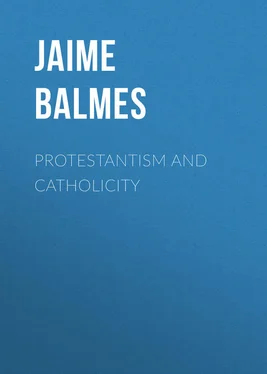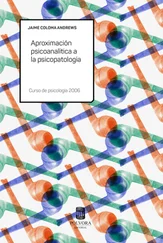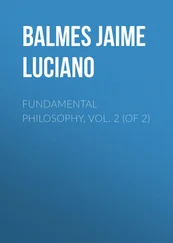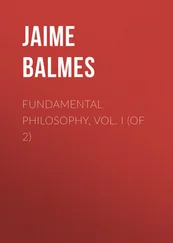Jaime Balmes - Protestantism and Catholicity
Здесь есть возможность читать онлайн «Jaime Balmes - Protestantism and Catholicity» — ознакомительный отрывок электронной книги совершенно бесплатно, а после прочтения отрывка купить полную версию. В некоторых случаях можно слушать аудио, скачать через торрент в формате fb2 и присутствует краткое содержание. Жанр: foreign_antique, foreign_prose, на английском языке. Описание произведения, (предисловие) а так же отзывы посетителей доступны на портале библиотеки ЛибКат.
- Название:Protestantism and Catholicity
- Автор:
- Жанр:
- Год:неизвестен
- ISBN:нет данных
- Рейтинг книги:3 / 5. Голосов: 1
-
Избранное:Добавить в избранное
- Отзывы:
-
Ваша оценка:
- 60
- 1
- 2
- 3
- 4
- 5
Protestantism and Catholicity: краткое содержание, описание и аннотация
Предлагаем к чтению аннотацию, описание, краткое содержание или предисловие (зависит от того, что написал сам автор книги «Protestantism and Catholicity»). Если вы не нашли необходимую информацию о книге — напишите в комментариях, мы постараемся отыскать её.
Protestantism and Catholicity — читать онлайн ознакомительный отрывок
Ниже представлен текст книги, разбитый по страницам. Система сохранения места последней прочитанной страницы, позволяет с удобством читать онлайн бесплатно книгу «Protestantism and Catholicity», без необходимости каждый раз заново искать на чём Вы остановились. Поставьте закладку, и сможете в любой момент перейти на страницу, на которой закончили чтение.
Интервал:
Закладка:
In man, as in the universe, all is wonderfully united; all the faculties of man have delicate and intimate relations with each other, and the movement of one chord in the soul makes all the others vibrate. It is necessary to call attention to this reciprocal dependence of all our faculties on each other, in order to anticipate an objection which may be made. We shall be told, all that has been said only proves that Catholicity has developed the individual in a mystical sense. No, the observations which I have made show something more than this; they prove that we owe to Catholicity the clear idea and lively feeling of moral order in all its greatness and beauty; they prove that we owe her the real strength of what we call conscience, and that if the individual believes himself to be called to a mighty destiny, confided to his own free will, and the care of which belongs entirely to him, it is to Catholicity he owes that belief; they prove that Catholicity has given man the true knowledge which he has of himself, the appreciation of his dignity, the respect which is paid to him as man; they prove that she has developed in our souls the germs of the noblest and most generous feelings; for she has raised our thoughts by the loftiest conceptions, dilated our hearts by the assurance of a liberty which nothing can take away, by the promise of an infinite reward, eternal happiness, while she leaves in our hands life and death, and makes us in a certain manner the arbiters of our own destiny. In all this there is more than mere mysticism; it is nothing less than the development of the entire man; nothing less than the true, the only noble, just, and reasonable individuality; nothing less than the collected powerful impulses which urge the individual towards perfection in every sense; it is nothing less than the first, the most indispensable, the most fruitful element of real civilization.
CHAPTER XXIV.
OF THE FAMILY. – MONOGAMY. – INDISSOLUBILITY OF THE CONJUGAL TIE
WE have seen what the individual owes to Catholicity; let us now see what the family owes her. It is clear that the individual, being the first element of the family, if it is Catholicity which has tended to perfect him, the improvement of the family will thus have been very much her work; but without insisting on this inference, I wish to consider the conjugal tie in itself, for which purpose it is necessary to call attention to woman. I will not repeat here what she was among the Romans, and what she is still among the nations who are not Christians; history, and still more the literature of Greece and Rome, afford us sad or rather shameful proofs on this subject; and all the nations of the earth offer us too many evidences of the truth and exactness of the observation of Buchanan, viz. that wherever Christianity does not prevail, there is a tendency to the degradation of woman. Perhaps on this point Protestantism will be unwilling to give way to Catholicity; it will assert that in all that affects woman the Reformation has in no degree prejudiced the civilization of Europe. We will not now inquire what evils Protestantism has occasioned in this respect; this question will be discussed in another part of the work; but it cannot be doubted, that when Protestantism appeared, the Catholic religion had already completed its task as far as woman is concerned. No one, indeed, is ignorant that the respect and consideration which are given to women, and the influence which they exercise on society, date further back than the first part of the 16th century. Hence it follows that Catholicity cannot have had Protestantism as a coadjutor; it acted entirely alone in this point, one of the most important of all true civilization; and if it is generally acknowledged that Christianity has placed woman in the rank which properly belongs to her, and which is most conducive to the good of the family and of society, this is a homage paid to Catholicity; for at the time when woman was raised from abjection, when it was attempted to restore her to the rank of companion of man, as worthy of him, those dissenting sects that also called themselves Christians did not exist, and there was no other Christianity than the Catholic Church.
It has been already remarked in the course of this work, that when I give titles and honours to Catholicity, I avoid having recourse to vague generalities, and endeavour to support my assertions by facts. The reader will naturally expect me to do the same here, and to point out to him what are the means which Catholicity has employed to give respect and dignity to woman; he shall not be deceived in his expectation. First, and before descending to details, we must observe that the grand ideas of Christianity with respect to humanity must have contributed, in an extraordinary manner, to the improvement of the lot of woman. These ideas, which applied without any difference to woman as well as to man, were an energetic protest against the state of degradation in which one-half of the human race was placed. The Christian doctrine made the existing prejudices against woman vanish for ever; it made her equal to man by unity of origin and destiny, and in the participation of the heavenly gifts; it enrolled her in the universal brotherhood of man, with his fellows and with Jesus Christ; it considered her as the child of God, the coheiress of Jesus Christ; as the companion of man, and no longer as a slave and the vile instrument of pleasure. Henceforth that philosophy which had attempted to degrade her, was silenced; that unblushing literature which treated women with so much insolence found a check in the Christian precepts, and a reprimand no less eloquent than severe in the dignified manner in which all the ecclesiastical writers, in imitation of the Scriptures, expressed themselves on woman. Yet, in spite of the beneficent influence which the Christian doctrines must have exercised by themselves, the desired end would not have been completely attained, had not the Church undertaken, with the warmest energy, to accomplish a work the most necessary, the most indispensable for the good organization of the family and society, I mean the reformation of marriage. The Christian doctrine on this point is very simple: one with one exclusively, and for ever . But the doctrine would have been powerless, if the Church had not undertaken to apply it, and if she had not carried on this task with invincible firmness; for the passions, above all those of man, rebel against such a doctrine; and they would undoubtedly have trodden it under foot, if they had not met with an insurmountable barrier, which did not leave them the most distant hope of triumph. Can Protestantism, which applauded with such senseless joy the scandal of Henry VIII., and accommodated itself so basely to the desires of the Landgrave of Hesse-Cassel, boast of having contributed to strengthen that barrier? What a surprising difference! During many centuries, amid circumstances the most various, and sometimes the most terrible, the Catholic Church struggles with intrepidity against the passions of potentates, to maintain unsullied the sanctity of marriage. Neither promises nor threats could move Rome; no means could obtain from her any thing contrary to the instructions of her Divine Master: Protestantism, at the first shock, or rather at the first shadow of the slightest embarrassment, at the mere fear of displeasing a prince who certainly was not very powerful, yields, humbles itself, consents to polygamy, betrays its own conscience, opens a wide door to the passions, and gives up to them the sanctity of marriage, the first pledge for the good of the family, the foundation-stone of true civilization.
Protestant society on this point, wiser than the miscalled reformers who attempted to guide it, with admirable good sense repudiated the consequences of the conduct of its chiefs; although it did not preserve the doctrines of Catholicity, it at least followed the salutary impulse which it had received from them, and polygamy was not established in Europe. But history records facts which show the weakness of the pretended reformation, and the vivifying power of Catholicity. It tells us to whom it is owing that the law of marriage, that palladium of society, was not falsified, perverted, destroyed, amid the barbarous ages, amid the most fearful corruption, violence, and ferocity, which prevailed everywhere, as well at the time when invading nations passed pell-mell over Europe, as in that of feudality, and when the power of kings had already been preponderant, – history will tell what tutelary force prevented the torrent of sensuality from overflowing with all its violence, with all its caprices, from bringing about the most profound disorganization, from corrupting the character of European civilization, and precipitating it into that fearful abyss in which the nations of Asia have been for so many centuries.
Читать дальшеИнтервал:
Закладка:
Похожие книги на «Protestantism and Catholicity»
Представляем Вашему вниманию похожие книги на «Protestantism and Catholicity» списком для выбора. Мы отобрали схожую по названию и смыслу литературу в надежде предоставить читателям больше вариантов отыскать новые, интересные, ещё непрочитанные произведения.
Обсуждение, отзывы о книге «Protestantism and Catholicity» и просто собственные мнения читателей. Оставьте ваши комментарии, напишите, что Вы думаете о произведении, его смысле или главных героях. Укажите что конкретно понравилось, а что нет, и почему Вы так считаете.












